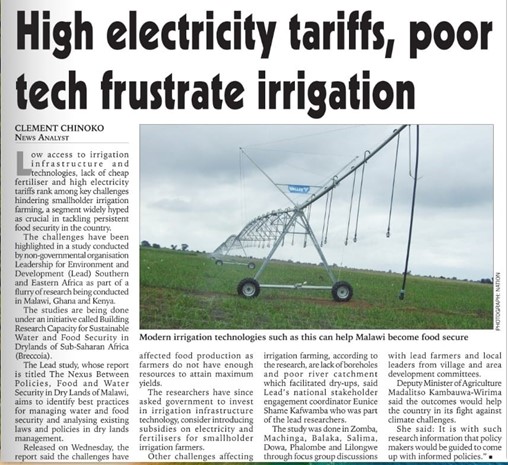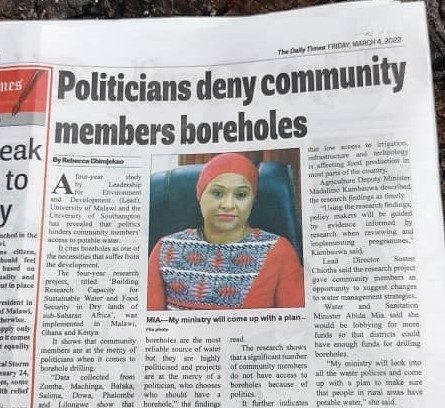By Eunice Shame Kafwamba

Bridging the gap between science and policy has been one of the activities LEAD has achieved under the BRECcIA project through research dissemination workshops and the media. These have provided interface among community, local level staff and high level policy makers.
Minister of Agriculture takes up energy tariff issue which is affecting irrigation farming
Through one of the Small Research Project titled “The nexus between policies food and water security in dry lands of Malawi” and Large Research Project titled “Bridging national strategy on sustainable development of water-energy-food systems to local scale needs in Malawi” LEAD has successfully translated research evidence into a policy agenda. The two research projects brings out evidence on how high electricity tariffs have affected irrigation farming in Malawi. During one if its research dissemination workshop on 2nd March 2022, Deputy Minister of Agriculture, Madalitso Kambauwa-Wilima was concerned over the evidence provided on how electricity has led to shut down and crippling of potential irrigation schemes. Through the meeting she was connected to one of the affected irrigation community, Lifuwu Rice Scheme and local level district staff that have been working with irrigation communities in the district. Lifuwu is one of the irrigation schemes that was upgraded by European Commission with high capacity irrigation pumps, but communities are failing to use the pumps since 2016 due to high electricity tariffs. The minister has planned to follow up the issue of electricity bill and also the energy for food production in general
The media amplifies key messages for action

LEAD has also been engaging the media in its dissemination activities. Through these engagement activities the media has been able to engage high level policy makers over some of the research findings. One the research findings that caught attention and reaction of policy makers is the issue of access to boreholes which is very low in communities. The media which was invited at a dissemination workshop, engaged the Ministry of Water and Sanitation Abida Mia who promised to lobby more funds towards drilling of boreholes and will look into the policies that are hindering people from having access to potable water.
Apart from platforms like dissemination workshops, LEAD in collaboration with UNIMA has also had private in-depth discussions with policy makers over policy implication of research findings. For Example
Prof Sosten Chiotha and Dr Mangani Katundu have had separate discussion with Deputy Minister of Agriculture over seed policy and climate change effects on agricultural production. In this meeting the minster made plans to visit one of the summer school study site which used to be an irrigation community but no longer is because all water reservoirs dried up due to changes in underground water reserve.
UN75
LEAD has further utilized any interface opportunity with policy makers. At UN 75 lead shared of the some of the research findings which triggered more discussions over the various issues coming from the SRPs.
